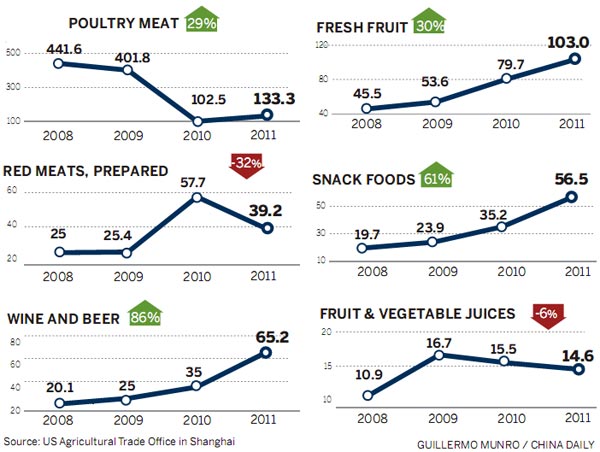The Chinese demand for imported US food reached $22 billion in 2011. It not only jumped 10-fold in volume in the past 15 years, the market has also "moved up the value chain", said Keith Schneller, agriculture director of the US Agricultural Trade Office in Shanghai.
"In the past, US exports to China were primarily for re-processing and re-exporting to other advanced economies like Japan and South Korea, but only in these five years (have we seen) the 'in China for China' trend, and it applies across sectors including dairy, seafood and berries," he said.
Du Xiaoxin, a master's degree candidate at Fudan University, shells out up to 200 yuan a month buying imported foods, including ingredients, snack foods and beverages. That is close to 10 percent of her monthly disposable income.
Du developed a taste for Western food while studying overseas, and she said eating those foods now reminds her of cheerful "tea times" she had abroad. "So, the price is not that a big deal," she said.
To beef up the market, the US Agricultural Trade Office coordinated 75 US companies and food associations to exhibit real American products at the 13th China International Food and Beverage Exhibition in Shanghai. The show also drew other food exporters who wish to cash in on China's huge market potential.
Mister Potato, Malaysian's top potato snacks maker, has been targeting China's teenagers and young adults since last year, after having successfully expanded to 80 countries.
In order to edge out competitors like Pringles and Lays, which came into China earlier, the company is creating elaborate promotion campaigns, including awarding lucky Chinese consumers free trips to the UK to meet with members of the Manchester United football team, said Leong Yuenlin, a company executive.
"It is a great opportunity for us as China is opening its huge market," said Hector Lescarbura, director of the Argentine Beef Promotion Institute.
At present, 15 Argentine exporters are permitted to sell beef in China. Many more are waiting for the permission or have expressed an interest, Lescarbura said.
"It takes a long time and it is very difficult to pass China's quality testing, but the market here is worth the effort," he said.
Contact the writers at [email protected] and [email protected]
 |
